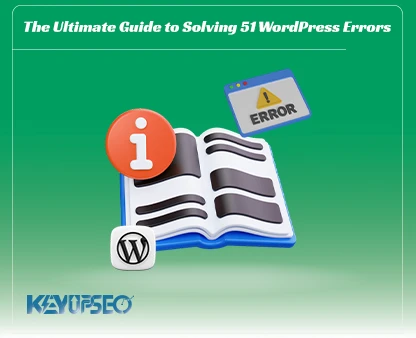
Choosing the Right Domain for the Best SEO Results
Choosing a domain for a business is certainly very exciting. At this stage, everything is usually well planned, and you have a lot of work energy; however, if you make a mistake in deciding your website domain, you will undoubtedly have a big problem.
Domain names indirectly impact SEO, and to get the best SEO results, you should keep some points in mind when picking them.
Research has shown that domain names affect the SEO status of a website. But how? Are there right and wrong ways to select a domain name? How can we improve the SEO status of our website by selecting the right domain?
Following all SEO tips together will help you increase Google visits to your website and gain more users.
We have explained important tips for deciding on a website domain to improve website SEO in this article.
Stay tuned with KeyUpSeo.
Avoid Choosing an Exact Match Domain
Many novice SEO consider choosing an Exact Match Domain as an easy solution to achieve Google rankings. But what is an Exact Match Domain?
An Exact Match Domain is a domain name that contains the main keyword of the website. This type of domain is known as a Keyword Domain among SEO experts.
For example, let’s say you want your website to rank high in Google search results for the keyword “Cheap Hotels”. In this situation, if you want to select an exact match domain for your website, your chosen domain would be cheaphotels.com.
Surely, by now, you think that the more keywords in your domain, the easier it will be to SEO your website, right? No, today’s search engine is not so easily fooled!
Google Update for Exact Match Domain
Back in the old days (in 2012, to be precise), Google noticed that many websites were trying to promote and improve their SEO status by deciding on an Exact Match domain. Back then, if you wanted to rank well in Google search results for the keyword “cheap Nokia phones”, there was no problem! Just got the domain cheapnokiaphones.com, and that was it! Your website would appear on the first page of Google results. You didn’t even need backlinks, quality content, or on-page SEO to do this!
But when Google realized this, it surprised all websites with a big update. This update was called the Exact Match Domain update.
In September 2012, Matt Cutts, head of Google’s web spam unit, announced on his X account that Google would change its algorithms to minimize the impact of low-quality, exact-match domains in search results. The EMD update eliminated the ranking of many websites that had matching domains. Also, domains that had average rankings fell to the bottom of the search results.
As we have seen, choosing an exact-match domain for your website doesn’t seem like a great idea.
Well, deciding on an Exact Match domain is one of those things that we shouldn’t do while selecting a domain. But the question is, what should you do to decide the right domain?
Deciding on a brand name as a domain name
The safest and easiest way to decide on a domain is to use a brand name. Why? Because customers remember you by your brand name and most of the traffic that enters your website comes from Navigational Search.
What is Navigational Search?
A Navigational Search is a type of search query in which the user tries to find your website in any way.
For example, our website users are most likely to use the following navigational queries to find the website:
- KeyUpSeo
- keyupseo
- Keyup seo
- Keyupseocom
No matter which of the above queries you search for, Google will display the keyupseo website along with links to its various pages in the highest ranking.
It is good to know that in the world of search engines, there are three main types of search queries:
- Navigational
- Informational
- Transactional
Currently, Informational queries are the most popular type of search query. Navigational queries are also in second place in terms of popularity.
If potential customers start their search like the examples above, they are more likely to find the website they are looking for. But there is an even more important reason to use a brand name in your website domain: brand signals.
What are brand signals?
Brand signals are signals that are sent to search engines every time your brand is mentioned or referenced on other websites. Brand signals are an important tool for improving and enhancing a site’s SEO.
Simply put, every time a website mentions your brand on one of its pages, a signal is sent to search engines. For example, by mentioning your name in this content, I have sent a Brand Signal to the brand keyupseo.
Of course, it should be said that the concept of brand signals is not limited to SEO and site optimization, and to be more precise, brand signals are more related to the concept of page rank than SEO.
Some SEO experts dream of a day when link building is irrelevant and keywords are no longer effective. They dream of a day when a website’s brand is the only factor in search engine presence. There’s still a long way to go, but brand signals are a step in the right direction.

Factors that make a website branded
But what makes a website branded? Here are some of the differences between branded websites and regular websites:
To create brand signals, SEO and content marketing alone aren’t enough. Instead, you need to engage in more branding-related activities:
- Have employees who work for your brand or company.
- Have a clear business address.
- Have a clear contact form with multiple real phone lines.
- Have real employees to answer calls.
- Your business is legal and registered.
- Have customers who search for your brand.
- Have lots of people talking about your brand.
Even Google’s top people, like Eric Schmidt and Matt Cutts, believe that brand signals are a way for Google to tell the difference between a low-quality website and a brand website.
But what does all this have to do with SEO and the domain name of the site? I can answer this question with any connection you can think of. Your brand name should be your domain name, because this will become the most important factor in having a reputable website in the future.
The impact of using keywords in the domain
If I were to explain briefly and simply, I would say that keywords are no longer as significant as they used to be. As time passes and your popularity and business grow, Google and other search engines learn to associate your brand with the keywords you are looking for.
Now the question arises: What happens if your brand name is a common word in the dictionary? How can Google distinguish the brand name from this word?
Well, if you want to find the answer to this question, just search for the word Apple in Google. I don’t see any information about apples in the search results. How about you?
Your business is certainly not as big as Apple, and that’s okay. Google can still identify brand signals and display your brand at the top of the search results.
Your brand is much more important than your domain name, but your domain name should be chosen based on your brand. If you’re having trouble deciding on a brand name, you can come up with a word or combine several words.
Keep in mind that keywords are very critical for page content and don’t necessarily need to be included in the domain.
To improve your website’s SEO, I recommend reading the Keyword density calculation guide.
What happens if a brand name contains a keyword?
Is it bad to have a keyword in a brand name? No, it’s not.
Domains that are a combination of a word and a keyword are called Partial Match Domains and do not hurt a site’s SEO. The reason for this is that:
Instead of focusing on the impact of a domain name on a website’s ranking, Google pays attention to the spam signals surrounding EMD and PMD domains.
The only problem with Exact Match and Partial Match domains is not the presence of keywords in the domain name, but the spammy activities that most of these websites have caused Google to focus more on them.
So, as we mentioned at the beginning of the content, if you are in the hotel booking industry and “cheap hotels” is your target keyword, you will most likely choose the domain cheaphotels.com for your website. As long as this website provides a good user experience and publishes great content every week, you don’t need to worry about being penalized by Google.
However, if you are still at the beginning and are planning to launch a website, it is better to avoid domains with keywords, especially exact-match domains!
In today’s digital search world, where machine learning algorithms are rapidly advancing, brand identity is essential. Today’s brand identity includes everything but keywords. Of course, in this article, we are not going to teach you how to pick a brand name, but the concepts of domain names and brand names are closely related.

Choosing a Com domain.
Having a top-level domain (TLD) can have a good impact on your site’s SEO. Currently, the com domain is the most common top-level domain.
You may have your reasons for choosing a domain other than com, but I suggest you be careful when choosing your website domain. For example, many spam websites are launched on biz. And us. Domains, and Google focuses specifically on these domains.
The domain extension will not have a direct negative impact on your site’s ranking. However, choosing the wrong TLD can make you appear as a spam website to Google, which will negatively affect your website's SEO.
Currently, the .com extension is the simplest, safest, and easiest extension available for selecting a domain.
Tips for deciding the best domain name
There are many important tips for deciding the best domain name, and you should consider several issues depending on your field of activity, but below we have listed some common tips for choosing a website domain.
All of the above are effective for growing your website's SEO, and it is better for you to follow them when creating your site to benefit from improved SEO and the Benefits of being seen on the first page of Google.
Don't use numbers in your domain
When someone hears your domain name from someone else, they don't know whether to use numbers or write it in letters when typing the domain. For example, the website Number1.com can also be written as NumberOne.com. Note that using numbers in the domain does not negatively affect your site's SEO and only misleads the audience.
Avoid intentional spelling mistakes
It may seem creative at first glance to decide on a domain (or even a brand name) with a spelling mistake. But you should know that most of the time, this creativity misleads your audience. Using a spelling mistake on purpose only makes it harder for your audience to remember your domain.
Use a combination of several words to create a long domain name
Using this method can be very creative and does not cause problems for your SEO. Of course, you should note that your combination of words is completely understandable and does not mislead the audience. For example, at first glance, the domain MensExchange.com looks like a normal domain, but just write it in lowercase letters to realize that it can be read in another way!
Don’t use hyphens in your domain name
Users often forget where hyphens should be in a domain name. Hyphens are common in website URLs, but they’re not a good idea in domain names.
Choose a short domain
A domain name should be at least 15 characters long. So, you can use shorter words or the first letters of many words.
Release date : 22 March, 2025













